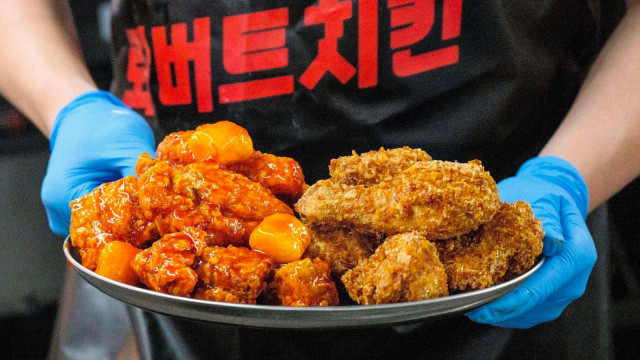Robot fried chicken: Entrepreneur seeks to improve South Korea's favourite food
Kang, a 38-year-old entrepreneur, saw an opportunity to improve the fried chicken business model - and the dish itself

Eaten at everything from tiny family gatherings to a 10-million-viewer live-streamed "mukbang" - eating broadcast - by K-pop star Jungkook of BTS fame, fried chicken is deeply embedded in South Korean culture. Paired with cold lager and known as "chimaek" - a portmanteau of the Korean words for chicken and beer - it is a staple of Seoul's famed baseball-watching experience.
The domestic market - the world's third largest, after the United States and China - is worth about seven trillion won ($5.3 billion), but labour shortages are starting to bite as South Korea faces a looming demographic disaster due to having the world's lowest birth rate.
According to industry research, around 54% of business owners in the food service sector report problems finding employees, a government survey last year found, with long hours and stressful conditions the likely culprit. Korean fried chicken is brined and double-fried, which gives it its signature crispy exterior, but the process - more elaborate than what is typically used by US fast food chains - creates additional labour and requires extended worker proximity to hot oil.
Enter Kang, a 38-year-old entrepreneur who saw an opportunity to improve the South Korean fried chicken business model - and the dish itself. "The market is huge," Kang told AFP at her Robert Chicken franchise. She said that chicken and pork cutlets are the most popular delivery orders in South Korea, and the industry could benefit from more automation to "effectively address labour costs and workforce shortages."
Kang's robot, composed of a simple, flexible mechanical arm, is capable of frying 100 chickens in two hours - a task that would require around five people and several deep fryers. But the robot makes the chicken more efficiently - it makes it more delicious, says Kang. "We can now say with confidence that our robot fries better than human beings do," she said.
Investing in 'foodtech'
Already a global cultural powerhouse and major semiconductor exporter, South Korea last year announced plans to plough millions of dollars into a "food-tech" fund to help startups working on high-tech food industry solutions. Seoul says such innovations could become a "new growth engine", arguing there is huge potential if the country's prowess in advanced robotics and AI technology could be combined with the competitiveness of Korean food classics like kimchi.
South Korea's existing food-tech industry - including everything from next-day grocery delivery app Market Kurly to AI smart kitchens to a "vegan egg" startup - is already worth millions, said food science professor Lee Ki-won at Seoul National University. Even South Korea's Samsung Electronics - one of the world's biggest tech companies - is trying to get in on the action, recently launching Samsung Food, an AI-personalised recipe and meal-planning platform available in eight languages.
Lee predicted South Korea's other major conglomerates are likely to follow Samsung into foodtech. "Delivering food using electric vehicles or having robots directly provide deliveries within apartment complexes, known as 'metamobility', could become a part of our daily lives," he said. "I am confident that within the next ten years, the food tech industry will transform into the leading sector in South Korea."
'Initially struggled'
Entrepreneur Kang now has 15 robot-made chicken restaurants in South Korea and one branch in Singapore. During AFP's visit to a Seoul branch, a robot meticulously handled the frying process - from immersing chicken in oil, flipping it for even cooking, to retrieving it at the perfect level of crispiness, as the irresistible scent of crunchy chicken wafted through the shop.
Many customers remained oblivious to the hard-working, robotic cook behind their meals. Kim Moon-jung, a 54-year-old insurance worker, said she was not sure how a robot would make the chicken differently from a human, "but one thing is certain - it tastes delicious".
The robot can monitor oil temperature and oxidation levels in real-time while it fries chicken, ensuring consistent taste and superior hygiene. When Kang first started her business, she "initially struggled" to see why anyone would use robots rather than human chefs. But "after developing these technologies, I've come to realise that from a customer's perspective, they're able to enjoy food that is not only cleaner but also tastier", she told AFP.
Her next venture is a tip-free bar in Koreatown in New York City, where the cocktails will feature Korea's soju rice wine - and will be made by robots.
Have something to add to the story? Share it in the comments below.



















COMMENTS
Comments are moderated and generally will be posted if they are on-topic and not abusive.
For more information, please see our Comments FAQ